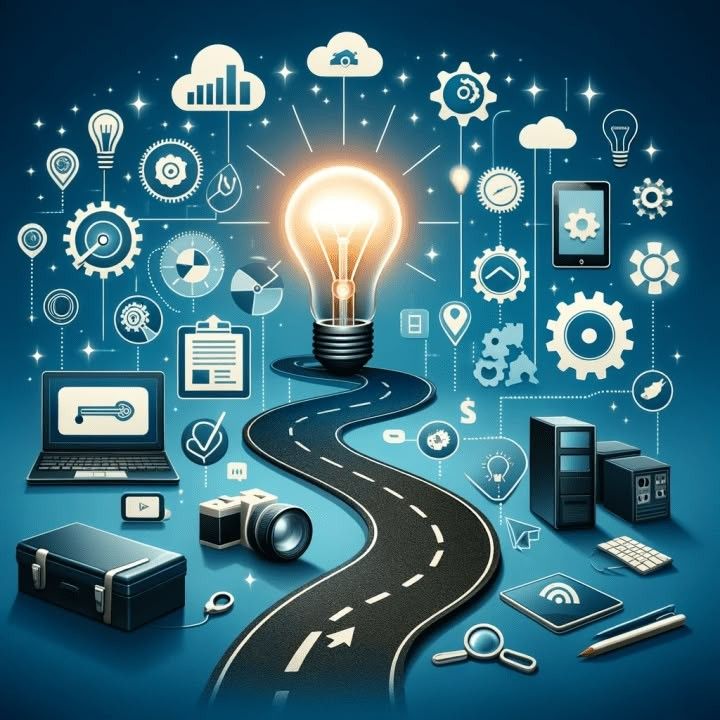An digital marketing helps brands understand users, personalize content, and boost engagement using smart tools like chatbots and analytics. From personalized Netflix suggestions to smart assistants like Alexa, AI is quietly reshaping the way we interact with the digital world. But one of the most innovative shifts is happening in the world of digital marketing. In this blog, we’ll explore how AI is changing digital marketing forever, making it smarter, faster, and more modified than ever before. 1. Smarter Customer Insights Through AI Understanding Consumer Behavior through AI One of the biggest challenges for marketers has always been understanding what their audience wants. Artifical Intelligence has changed this by allowing marketers to analyze huge volumes of customer data from search patterns to purchase behavior in real time. Using AI-powered tools like Google Analytics, HubSpot, or IBM Watson, businesses can now track not just what users are doing, but why they’re doing it. This gives marketers a deeper understanding of their audience’s needs, allowing them to create more targeted campaigns. Predictive Analytics Powered by AI Artifical Intelligence also enables predictive analytics the ability to forecast future consumer actions. By recognizing patterns in past data, AI can predict what products a customer might be interested in, when they might make a purchase, and how they prefer to be reached. 2. Hyper-Personalized Marketing at Scale Personalization is no longer a luxury, it’s an expectation. Consumers want content that speaks to them directly, and AI makes it possible to deliver that level of personalization to thousands or even millions of users simultaneously. AI-Driven Email Marketing Tools like Mailchimp and Active Campaign use AI to optimize email content, subject lines, and send times based on user behavior. This increases open rates, click-through rates, and ultimately, conversions. Dynamic Content with AI in Digital Marketing Artifical Intelligence enables websites to show different content to different users based on their preferences and behavior. For example, Amazon displays different homepage banners to users depending on their shopping history, thanks to AI-powered personalization. 3. AI-Powered Chatbots and Customer Service Customer service is one area where Artifical Intelligence is making a dramatic impact. AI-powered chatbots are available 24/7, respond instantly, and can handle thousands of customer queries at once. AI in Digital Marketing for Real-Time Assistance AI chatbots are more than just automated responders. Advanced bots use natural language processing (NLP) to understand context and provide human-like conversations. This improves customer satisfaction while reducing wait times and operational costs. Brands like Sephora, H&M, and Domino’s have successfully combined AI chatbots into their websites and apps to assist customers with product selection, order tracking, and FAQs. 4. Revolutionizing Content Creation Content is king in digital marketing, but creating high-quality content consistently is time-consuming. AI tools are changing this. AI Writing Tools Platforms like Jasper, Writesonic, and ChatGPT help marketers write blog posts, ad copy, product descriptions, and social media content quickly. These tools can also adjust tone, length, and style to suit different audiences. While human creativity is still vital, artifical Intelligence can handle the first drafts, giving content creators a head start and saving valuable time. Video and Visual AI Content Creation AI tools like Pictory, Synthesia, and Canva’s Magic Design help create engaging videos, graphics, and presentations. They analyze trends and user data to suggest visuals and layouts that are more likely to grab attention. 5. Voice Search and AI Assistants With the growing use of Siri, Alexa, and Google Assistant, voice search is reshaping how consumers find information. Optimizing for Voice Search AI-driven voice assistants interpret natural language, making search more conversational. This means marketers must rethink their SEO strategies — focusing on long-tail keywords and question-based queries that reflect how people actually speak. The Impact on SEO Traditional keyword stuffing no longer works. AI algorithms like Google’s BERT and MUM focus on search intent and context, rewarding content that truly answers the user’s question in a natural, useful wa 6. AI in Programmatic Advertising Programmatic advertising uses AI to automate the buying and placement of ads in real time, targeting users based on data such as browsing behavior, location, and device type. Real-Time Optimization AI analyzes which ads perform best and reallocates the budget automatically to high-performing campaigns. This real-time bidding (RTB) ensures marketers get better ROI with less manual effort. Precision Targeting Instead of casting a wide net, AI helps advertisers laser-target the right people at the right time with the right message. This level of precision was nearly impossible with traditional methods. 10. The Human-AI Balance in Marketing Despite all the advancements, AI is not replacing marketers, it’s empowering them. Human Creativity Still Matters AI is excellent at analyzing data and generating patterns, but it can’t replace human intuition, emotional intelligence, or storytelling. The best results come from a partnership between human marketers and AI tools. Upskilling the Workforce To thrive in the AI-driven marketing landscape, professionals need to learn how to work with AI, interpret data, and apply insights creatively. Conclusion: The Future Is AI-Driven, But Human-Led AI is not just a tool, it’s a game-changer for digital marketing. From hyper-personalization to predictive analytics, content creation to customer service, AI is transforming every corner of the marketing world. As AI technology continues to evolve, marketers who embrace it will stay ahead of the curve. But those who combine AI’s power with human creativity, empathy, and strategic thinking will truly thrive in this new digital era. Now is the time to learn, adapt, and reimagine what’s possible. The future of digital marketing is here, and it’s powered by A.
Elementor #316
Top 10 Digital Tools Everyone Should Master in 2025
Discover the top 10 digital tools you need to master in 2025. From collaboration to productivity, these tech tools will boost your career and digital literacy. Introduction As technology continues to transform our lives and workplaces, being digitally literate is no longer enough. To stay competitive and productive in 2025, you need to master the digital tools that drive modern communication, collaboration, and creation. Whether you’re a student, employee, freelancer, or entrepreneur, these tools are essential for succeeding in a tech-powered world. In this blog post, we’ll explore the top 10 digital tools that everyone should know how to use—and why they matter. 1. Notion AI 2. ChatGPT-5 (via OpenAI) 3. Luma AI What It Does: Turns photos or videos into 3D models using neural rendering. Trending For: Designers, game developers, AR/VR creators. Why It’s Hot: Pioneering 3D content creation with ease. 4. Runway ML (Gen-2) 5. Perplexity AI What It Does: AI-powered search engine with real-time citations. Trending For: Researchers, students, fact-checkers. Why It’s Hot: Trustworthy, fast, and citation-friendly search tool. 6. Gamma app What It Does: AI that creates stunning presentations, memos, and documents. Trending For: Professionals, agencies, freelancers. Why It’s Hot: Saves hours of design work, powered by GPT & design AI. 7. Tana What It Does: Next-gen productivity app that blends note-taking, to-do lists, and knowledge graph. Trending For: Researchers, academics, digital minimalists. Why It’s Hot: Combines Notion’s flexibility with Roam’s intelligence. 8. Descript (AI-Powered Podcast & Video Editor) What It Does: Edits audio/video like a document with AI transcription, voice cloning, filler word removal. Trending For: Podcasters, content creators, YouTubers. Why It’s Hot: Simplifies editing and voice work. 9. Eleven Labs
SEO in 2025: What’s Changing and How to Stay Ahead
Search Engine Optimization (SEO in 2025) is not what it used to be. As we enter 2025, digital marketers, business owners, and content creators must adapt to major changes in the way search engines rank and display content. With artificial intelligence (AI), voice search, and user intent becoming more important than ever, it’s time to rethink traditional strategies. In this blog post, we’ll dive deep into SEO trends in 2025, explain what’s changing, and guide you on how to stay ahead in this fast-evolving digital world. The Evolution of SEO: A Quick Overview Before we get into what’s new, let’s briefly understand how SEO has evolved: Now, in 2025, SEO is smarter, more personalized, and heavily driven by AI and user behavior. What’s Changing in SEO in 2025? AI is Taking Over Search With AI like Google’s MUM (Multitask Unified Model) and Chat-based search assistants growing, search engines now understand context better than ever. What this means: Voice Search SEO is Now Essential More than 60% of searches are now done through voice (smartphones, smart assistants like Alexa and Siri). Voice queries are longer, natural, and question-based. Action point: Search is Going Visual and Multimodal Visual search tools like Google Lens and AI-generated image results are changing the game. Tips to optimize for visual search: Mobile-First Indexing Is Non-Negotiable Google now indexes mobile versions of sites first. A poor mobile experience will hurt your rankings. Checklist: How to Optimize Your Content Strategy for SEO in 2025 Write for Humans, Optimized for Search Engines In 2025, user intent is the new king. Content should: Use natural language and structured subheadings to make content skimmable and easy to understand. Use Semantic SEO and Topical Clusters Instead of targeting one keyword per post, create topic clusters that cover a subject in depth. Example:Main Topic: Digital MarketingClusters: SEO, email marketing, PPC, social media, content strategy Interlink these blogs to show authority and boost your ranking. Include AI-Generated and Interactive Content Interactive content like: …keeps users engaged and reduces bounce rates, improving SEO metrics. On-Page SEO Best Practices in 2025 Make sure your title: Meta description should: Use Schema Markup and Structured Data Google loves structured data because it helps understand your content better. Add schema for: This helps you get rich snippets in search results. onclusion: The Future of SEO is Human-Centric and Tech-Driven SEO in 2025 is smarter, more intuitive, and less about tricking the algorithm. It’s about understanding your audience, creating quality content, and staying updated with the latest SEO trends and Google algorithm updates. If you want to succeed in digital marketing, start adapting your SEO strategy now. Invest in content, UX, mobile performance, and voice search optimization—and you’ll be ready for whatever the future of search brings.
Digital Skills for the Modern Workplace
In today’s world, the workplace is changing very quickly. New technologies are being used everywhere, from offices to factories. This means that digital skills are now more important than ever before. Whether you work in a small shop or a big company, having good digital skills can help you do your job better and grow in your career. What Are Digital Skills? Digital skills are the abilities needed to use digital devices, communication tools, and online networks to access and manage information. These skills include using computers, smartphones, the internet, apps, and other tools to work, communicate, and solve problems. Some basic digital skills include: More advanced digital skills might include: Essential Digital Skills for Every Worker Conclusion Digital skills are no longer optional in today’s modern workplace. From basic computer use to advanced data analysis, these skills help you work better, find better jobs, and stay ahead in your career. No matter your age or job, learning digital skills is a smart step toward success. Start small, keep learning, and you’ll be ready for the digital future.
Hello world!
Welcome to WordPress. This is your first post. Edit or delete it, then start writing!


